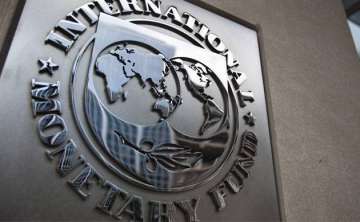India recognises the need for environmentally sustainable development strategy: IMF
The International Monetary Fund looks at India as a country that recognizes the need for an environmentally sustainable development strategy as the global community gears up for a decisive fight against climate change.

The International Monetary Fund looks at India as a country that recognizes the need for an environmentally sustainable development strategy as the global community gears up for a decisive fight against climate change.
"If you look at India in the last generation…India has been undergoing development. India has been undergoing a transformation. India has become a major player in the world economy. India is a great power and we look at India as a country that recognizes the need for an environmentally sustainable development strategy," Vitor Gaspar, Director of the IMF’s Fiscal Affairs Department told PTI in an interview.
Noting that India is particularly concerned about prospects for the poorest segments of its population in the context of this process of development, he explained how does climate change fit into the framework.
"I would say that there are two perspectives that one can look at. One, given its status as a major economy in the world, India has a critical role to play at the global level. In this context it's important to recognize that India is especially vulnerable to climate change. So, India does have a strong interest in advocating for a global action," Gasper said.
From this viewpoint, India is fully committed to the Paris agreement. It has made its nationally determined contribution pledges, and that implies reducing emissions of CO2 by a third below 2005 levels that is relative to the energy intensity of GDP and India seems to be on track to deliver on its pledges, he added.
Referring to the latest report on fiscal monitor, he said, IMF make the point that the nationally determined contributions that were made by countries for the Paris agreement will not deliver safe levels of temperature increases.
"To do so, it's necessary to be more ambitious and we believe that India will be part of that effort to be more ambitious. We call India, we call all other large players to do additional efforts to bring us on track to limit temperature increases to two degrees rather than three," Gasper said, adding the goal of having all cars on the road transformed to electricity by 2030 is ambitious goal.
The other aspect which is very interesting in case of India is the local perspective, the IMF official said, referring to CO2 emissions that contribute to outdoor air pollution. If one takes into account these local aspects of air pollution, one sees that India actually benefits itself from curbing CO2 emissions even without taking into account the global effects of climate change, he noted.
In its latest research, Gasper said, the IMF has shown that for a USD 50 per tonne carbon tax, the net benefits for India would be more than two per cent of India's GDP.
"In the distribution of countries that we put in that particular chart, India is in the top three. It ranks third in the top three. The two countries that are above India on the list are Russia and China. So, it's Russia, China, and India in terms of net benefits," he asserted.
India has already made considerable progress in reforming energy prices. It has removed energy subsidies to some extent. Gasoline prices were liberalised in 2010. Diesel and natural gas prices were liberalised in 2014, he said.
"India has introduced a very interesting new instrument, which is a clean environment cess. It's an excise tax, but it is an excise tax that targets coal production and import. There is a very interesting instrument and it's one which is very appropriate for India, because India can make a tremendous amount of progress by targeting reductions in energy production using coal," the top IMF official said.
It can approximate very much a broader solution by doing so. "It does seem that India could consider the possibility to increase this tax and that would be an effective instrument to reduce CO2 emissions," Gasper said.
"Now it's very important to understand that this choice, these policy choices are not easy. India is still very much trying to improve access to electricity by its population. But, if one does tax coal produced energy, one generates revenues that can be used to subsidise small users of electricity," he said, adding there's a panoply of combinations of instruments that can be used, and what is appropriate for India is up for India to decide.
"Green transformation of economies and societies is one of those transformational changes that must be taken into account. That challenge is particularly pressing in India because India has a growing population. India has a young population and it will have to create millions of jobs going forward. And for the future of India, it will be very important that those millions of jobs created are good jobs," Gasper said.
On whether green energy can create good jobs, the official said, “That requires one to have this comprehensive approach to sustainable and inclusive growth. That requires taking into account the combination of the policy instruments, be very clear about one's goals and being capable of implementing policies in the right way over time. As we always emphasise at the fund, stability and sustainability go together".